My blog has moved! http://www.patheos.com/blogs/markdroberts/
|
 |
Twitter Feed for My Recent Blog Posts and Other Tweets |
My blog has moved! http://www.patheos.com/blogs/markdroberts/
|
The Hardest Thing About Being a Pastor
By Mark D. Roberts | Thursday, September 27, 2007
Part 10 of series: Grace in the Rearview Mirror: A Pastoral Retrospective
Permalink for this post / Permalink for this series
In yesterday’s post I explained several things I found difficult about being a parish pastor: the difficulty of certain decisions, the heaviness of people’s burdens, the painfulness of receiving criticism, and the implications of personnel decisions. For me, these were indeed troublesome. But the hardest thing about being a pastor, in my experience, is dealing with people’s expectations.
People in churches expect many things of their pastors. They expect us:
• To be good oral communicators and to have truthful theology.
• To be caring counselors, good listeners and people of prayer who can help folks get through hard times and grow in their faith.
• To be present in personal emergencies, like unexpected hospitalizations or deaths in a family.
• To guide then through the intricacies of planning and performing weddings and memorial services.
• To be visionary leaders who can help churches both remain strong and grow in their ministries.
• To be wise and attentive managers of staff (if that’s in our job descriptions).
• To be decent writers, at least for the church newsletter and for other pastoral communications within the church.
• To be able to respond intelligently to a myriad of personal and theological questions.
• To be readily available to the congregation.
• To represent the church well in the community.
• To live exemplary moral lives.
• To be prayerful both in public and in private.
I’ll stop here, though you could certainly add to my list.
Let me say clearly that I think many of these expectations are quite fair. I think almost all pastors should be good at preaching or teaching, and should be caring people who set a good example in the way they live and who are indeed people of prayer. So I’m not complaining about the fact that people have expectations for pastors.
Also, you may have noticed that I said the hardest part of pastoring is “dealing with people’s expectations.” This is the responsibility of the pastor. The fact that I sometimes had a hard time dealing with the expectations people had for me isn’t necessarily their fault at all. It often had to do with my own insecurity, need to please, and lack of clarity about my own calling.
But I think it’s certainly true that it isn’t quite fair to expect pastors to be good at all of the things on my list. For example, people who are visionary leaders tend not to be great managers because different skill sets are needed for the different tasks. Strong managers often have to be tough with people, which is not a trait easily found among tenderhearted types who are good pastoral counselors. Or, if a pastor is going to be an effective preacher/teacher, this requires time for study. Devoting such time means that the pastor cannot be available to the congregation in the way some folks would like.
I found the diverse expectations of people difficult because it was absolutely impossible for me to fulfill such diverse expectations, and that meant I had to live with a measure of unhappiness with me. This was not easy for me. But some good things came out of it.
For one thing, I was continually forced to evaluate myself and my work. Was I doing the most important things? Was I shaping my priorities according to God’s truth, and not according to people’s wishes?
Toward the end of my tenure at Irvine Presbyterian Church, I began to ask my board of elders for help with my “diverse expectations” problem. How I wish I had done this years earlier! They were willing to help me, and so a conversation began. That discussion wasn’t an easy one because, as you might imagine, the elders themselves had differing views on how I should spend my time. Some wanted me to focus on teaching and preaching. Others preferred that I spend more time in personal counseling and discipleship. Others thought my priorities should be in the area of personnel and program management. Nevertheless, I’m glad we began this conversation, even though it ended up not being relevant to my particular ministry. It is the beginning of a crucial conversation about the job description of the pastor who will replace me.
By far the best thing about the hardest part of being a pastor was the fact that, when I felt overwhelmed by people’s expectations, I was forced to turn to the Lord, to seek God’s wisdom and guidance, as well as His comfort. I had to remember who my one true Boss was, and whom I most sought to please. Knowing God’s pleasure in my pastoral efforts gave the strength to do what I believed to be most important, even if in doing so I wasn’t winning any popularity contests.
Of course what I’ve just said about living to please God isn’t simply for pastors. All of us will find our true meaning and focus in life when we seek God’s pleasure above all else.
Topics: Pastors and Churches | 7 Comments »
The Best Job in the World, Except . . .
By Mark D. Roberts | Wednesday, September 26, 2007
Part 9 of series: Grace in the Rearview Mirror: A Pastoral Retrospective
Permalink for this post / Permalink for this series
In my last post I explained why I often thought that I had the best job in the world as Pastor of Irvine Presbyterian Church. In fact, I often told people that I felt this way about 75% of the time. About 23% of the time I felt that I had, well, a job. It wasn’t especially wonderful or awful. It was simply a job. If you’re good at math, you realize that I’ve left out 2% of my experience as a pastor. During that 2%, I felt as if I had one of the hardest jobs in the world.
Pastoring isn’t hard the way cleaning bathrooms is hard (a job I did while in college). It isn’t hard in the same way as digging trenches or discovering the properties of sub-atomic particles. And it isn’t hard in the way being a mother of toddlers is hard, or being a kindergarten teacher. And it surely isn’t hard in the mode of a soldier or a firefighter or a police officer.
So what makes pastoring hard? There are a variety of factors. One has to do with the complexity and significance of certain pastoral decisions. There were times I had to make judgments that felt way out of my league. In these times I got the best input I could get, I prayed like mad, and then decided. I’m sure other jobs require a similar kind of decision-making. Some, no doubt, involve even higher stakes. I never had to decide whether or not to go to war, or whether to send troops into a particularly dangerous area.
At times, pastoring is hard because the needs of people are heavy, and pastors are called to help carry them. So many times I’d listen to people’s struggles within their marriages, for example, and ache over what seemed like impossible obstacles to a healthy marriage. I’d end up a day feeling wiped out emotionally. I expect that others in helping professions, like doctors, counselors, and teachers, have similar experiences. (Photo: A picture of me preaching at our “post-contemporary” Veritas worship service.)
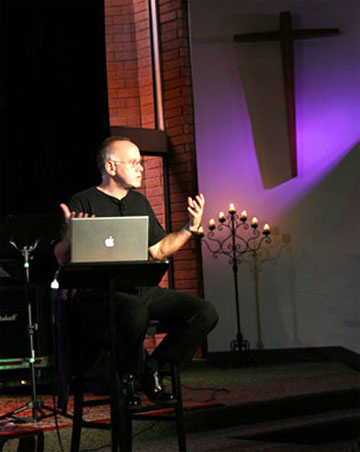 For me, and for many other pastors I know, one of the toughest parts of the job involves receiving criticism. I’m aware that most human beings don’t like this, but it can be especially hard for pastors for a couple of reasons. First, pastors tend to be tenderhearted people, folk who would be by nature and upbringing ill-prepared to handle harsh criticism. Second, much of pastoring is very personal. When I give a lecture in a seminary course, if someone doesn’t like the lecture, I don’t fret too much. But if somebody doesn’t like a sermon, I take this personally, because preaching is personal, intensely personal. When I preaching, I don’t just lay out interesting theological ideas. I bare my soul, often sharing my deepest convictions and sometimes even my personal failures. If somebody doesn’t like a sermon, chances are pretty good that somebody doesn’t like me, or at least a substantial part of me. And this hurts.
For me, and for many other pastors I know, one of the toughest parts of the job involves receiving criticism. I’m aware that most human beings don’t like this, but it can be especially hard for pastors for a couple of reasons. First, pastors tend to be tenderhearted people, folk who would be by nature and upbringing ill-prepared to handle harsh criticism. Second, much of pastoring is very personal. When I give a lecture in a seminary course, if someone doesn’t like the lecture, I don’t fret too much. But if somebody doesn’t like a sermon, I take this personally, because preaching is personal, intensely personal. When I preaching, I don’t just lay out interesting theological ideas. I bare my soul, often sharing my deepest convictions and sometimes even my personal failures. If somebody doesn’t like a sermon, chances are pretty good that somebody doesn’t like me, or at least a substantial part of me. And this hurts.
Let me be clear, in defense of the truly wonderful congregation at Irvine Presbyterian, that the vast majority of comments I received during my tenure were positive. Most of the time I felt greatly loved and appreciated. The actual ratio of praise to criticism was, for me, probably something like fifty to one. But because of my own sensitivity, combined with my insecurity, one word of criticism had the power to outweigh five hundred words of praise. This was my problem, to be sure, but it didn’t mix well with being a pastor. It was also true, by the way, that sometimes criticism I received was warranted, and ultimately helpful to me. But this didn’t mean I found criticism easy to hear.
Part of what makes receiving criticism in church so hard is the way some people do it. Now I should hasten to add at this point that the majority of people in my church who shared a critical word with me did so with due love and respect. But some didn’t. And a few got downright mean. Over time, I came to understand that the nasty folk were almost always overreacting because of some pain in their own past. If somebody chewed me out mercilessly, changes were good that person had a terrible relationship with a merciless father or mother or both. Nevertheless, it was hard to receive such harshness graciously. Some folks would tell me that I needed to get thicker skin. But I think thick skin is pretty much incompatible with Christ-like pastoring.
A fourth reason I found pastoring difficult had to do with personnel issues. As Pastor of Irvine Presbyterian Church, I was also “Head of Staff.” This meant I was, at least in some capacity, the boss. (In our strange Presbyterian system, however, my actual authority was quite limited.) Therefore, if a staff person in a significant ministry role wasn’t working out, I was significantly involved in the process of letting that person go, or, to be fully honest, making that person go. As a softhearted person, this was very hard for me. But it was complicated by the fact that I was doing this in a church, where, often, the staff person who needed to leave had many friends and supporters. So almost inevitably, when it was time for a staff person to leave, or way past time, the process was very painful and divisive within the church. Every time we let somebody go, we’d lose members as well.
So far I’ve said that pastoring is hard because of the difficulty of some decisions, and the heaviness of people’s burdens, and the painfulness of receiving criticism, and the implications of personnel decisions. But I haven’t mentioned the aspect of pastoral life that I found most challenging of all. I’ll save that for tomorrow’s post.
Topics: Pastors and Churches | 3 Comments »
The Best Job in the World
By Mark D. Roberts | Tuesday, September 25, 2007
Part 8 of series: Grace in the Rearview Mirror: A Pastoral Retrospective
Permalink for this post / Permalink for this series
There were many times during the past sixteen years when I thought I had the best job in the world. Yes, of course there were other times as well, and I’ll have something to say about them in due course. But for most of my years as pastor of Irvine Presbyterian Church, I felt extraordinarily blessed.
When did I think I had the best job in the world? There were many times, actually. Often it would happen on Thursday mornings. Thursday, you see, was my sermon prep day. It began with what I called The Pastor’s Study, a dialogical Bible study of about fifteen people. We’d focus on the text I was going to preach on that week. I’d prepare some comments and background. Then we’d dive into the text and its meaning for our lives. This was some of the most fun I had as a pastor (truly), and I learned a great deal while sharing life with some great folks. Then, after the Pastor’s Study, I’d spend the rest of the day working on my sermon. There were many times, dozens and dozens, when I’d think to myself: “What a fantastic job! I get to study the Bible and talk to people about it, and they pay me for this!”
I sometimes felt as if I had the best job in the world when I got to officiate at weddings, especially weddings for people I knew well or their children. First I’d get to meet with people and share some sweet moments as I did pre-marital counseling and worked with them on the planning of the wedding. Then I’d get the best seat in the house for the wedding itself. (Well, not a seat, actually, because I’d be standing. But you get the point.)
One of the greatest privileges of being a pastor is that people share their hearts with you. They come in with the most tender parts of their lives, sharing their fears, their failures, their dreams, their hopes. Yet the wonderful part for me wasn’t just the trust involved in such conversations, but the joy of seeing God work in people’s lives in a deep way.
This points to what I believe is the greatest blessing in being a pastor. In so many different ways over the years I was able to be used by God in people’s lives. Sometimes I’d preach a sermon and a people would put their faith in Christ for the first time. Or I’d pray for folks and experience God’s grace at work in their lives. Or maybe I’d throw out some wild idea in a meeting of my elders, only to see that idea turn into a ministry that made a real difference in people’s lives. (Photo: the sanctuary of Irvine Presbyterian Church on Easter morning)
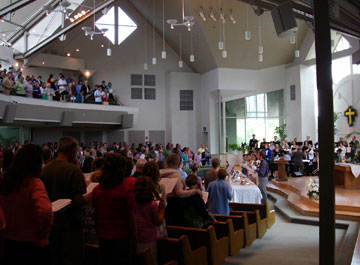 For example, I’ll never forget an Easter morning several years ago. I preached, as always, a sermon that focused on the good news of the resurrection, and that called people to put their faith in Christ. (Actually, to be precise, I preached that sermon four times each Easter morning.) One year, after the second service, a woman from our congregation came up to me in tears.
For example, I’ll never forget an Easter morning several years ago. I preached, as always, a sermon that focused on the good news of the resurrection, and that called people to put their faith in Christ. (Actually, to be precise, I preached that sermon four times each Easter morning.) One year, after the second service, a woman from our congregation came up to me in tears.
“I need you to know what happened during the last service,” she said.
“What was it?” I asked, not sure whether her tears were joyful or sorrowful.
“I brought my mother to church today, as I have for so many years. She isn’t a believer, but she’ll come with me on Easter. I always pray that she’ll become a Christian, but it never happened . . . until today! When you invited people to give their lives to Christ today, my mother did! And then she told me! I am overcome with joy and thanks, and I wanted you to know.”
Then I too was overcome with joy and thanks. After I finished greeting the other worshipers, I made my way to a small room behind our sanctuary, where I could be alone. I literally got on my knees and wept with joy, thanking God for the sheer privilege of preaching the gospel. What an amazing thing to be a part of God’s saving work in people’s lives! And you know what, you don’t have to be a pastor to experience this sort of joy. All of God’s people are called into His service.
Topics: Pastors and Churches | 1 Comment »
The Stupidest Thing I Ever Said in a Sermon
By Mark D. Roberts | Monday, September 24, 2007
Part 7 of series: Grace in the Rearview Mirror: A Pastoral Retrospective
Permalink for this post / Permalink for this series
I do not look back at my ministry at Irvine Presbyterian Church with many regrets. Oh, I certainly made my fair share of errors. But the congregation managed to forgive me for these, and God had a way of turning what I had messed up into good. I wouldn’t even want to retract much of what I said in my sermons, except, perhaps, for one foolish illustration.
It happened years ago, maybe in my first couple of years as pastor of the Irvine church. I was preaching a sermon on 2 Corinthians 5, where the text says that “the love of Christ urges us on” (5:14). Other translations say the love of Christ “controls us” (ESV) or “compels us” (NIV). The Greek verb from which these translations derive, synechein, literally means “to surround” or “to constrain.” So we have a rather strange image of the love of Christ both surrounding us and, at the same time, urging us on. What sense does this make?
To answer this question, I came up with an illustration that seemed to work. In my sermon I said something like this:
So how can the love of Christ both surround us and move us forward at the same time? I think of those little packets of condiments. Now I’ve got to admit that sometimes I hate those things. They never seem to work quite right. Sometimes they break, making a mess all over the place. One time when I was on a plane, one of them squirted all over my tie. But what you’re trying to do is to squeeze them on the outside so the substance on the inside will go forward. That’s rather like the love of Christ.
 Now as I was using this silly little analogy, the congregation responded much more than I had anticipated. Rather than a little chuckle, my condiment illustration received roaring laughter, especially the part about squirting on my tie. It didn’t make much sense to me, but I went on with the sermon.
Now as I was using this silly little analogy, the congregation responded much more than I had anticipated. Rather than a little chuckle, my condiment illustration received roaring laughter, especially the part about squirting on my tie. It didn’t make much sense to me, but I went on with the sermon.
Afterwards, a friend came up to me and said, “Do you know why we were laughing so hard at your bit about the packets of condiments?”
“No,” I admitted, “it made no sense to me why I got such a strong response. My illustration was silly, but not that funny.”
“I know what you were trying to say,” he explained. “But you have to realize that we didn’t hear you correctly. You said ‘little packets of condiments.’ But we thought you said ‘little packets of condoms.’ If you go back and think about what you said, you’ll realize why we were laughing so hard.”
So I went back over what I had said, and realized to my horror that my little packets of condiments illustrations didn’t work quite as I had planned. (Go back and change “condiments” to “condoms” and you’ll see what I mean!) Embarrassed, I thanked my friend for letting me know. In the second service I jettisoned the word “condiments,” speaking instead of “little packets of ketchup.” As expected, I got a few chuckles from the congregation, and that was all, thank God!
And, yes, folks did forgive me for a poor choice of words, though a few of them didn’t let me forget about it for a while. They had too much fun laughing at what they thought I had said in the middle of church.
Topics: Pastors and Churches | 4 Comments »
Inspiration from the Pray the Gospels
By Mark D. Roberts | Sunday, September 23, 2007
Excerpt
Again Jesus spoke to them, saying, “I am the light of the world. Whoever follows me will never walk in darkness but will have the light of life.”
John 8:12
Click here to read all of John 8:12-30
Prayer
Light of the world, shine on me!
Light of the world, shine in my heart, revealing my sin so that I might confess it to You.
Light of the world, shine into the darkness of my soul, renewing that which the world has made dingy.
Light of the world, shine in my mind, that I might see Your truth clearly.
Light of the world, shine through me, so that I might reflect Your radiance into this world.
Light of the world, shine on me!
Questions for Reflection
In what ways is Jesus the light of your life?
Does Jesus shine through you to the world?
How might you reflect the light of Christ today?

The lighthouse of Big Sur Light Station
in northern California
Topics: Sunday Inspiration | No Comments »
Memories in Pictures, A Few More
By Mark D. Roberts | Saturday, September 22, 2007
Part 6 of series: Grace in the Rearview Mirror: A Pastoral Retrospective
Permalink for this post / Permalink for this series
| A few men at our Men’s Retreat in the “Whar’s the bar?” skit. A fine tradition of humiliating the newcomers in Christian love. | 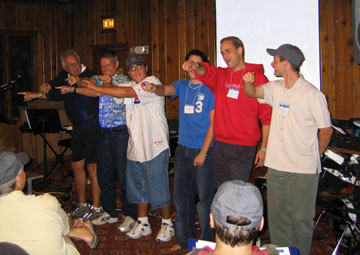 |
|
| A family working on their craft at our Christmas Craft Night in early December. |  |
|
| Tim the Tool Man Taylor (aka Mark Roberts) and Al Borland (aka Tim Avazian, one of my associate pastors), all dressed up for our annual VBS skit. That’s a fine head of hair I have, don’t you think. In truth, a member of our church who knew me well say me and thought to himself: “I never knew Mark had a brother. His brother has a terrible haircut!” |  |
|
| A couple of church members dressed up for our annual Harvest Festival in October. |  |
|
| My daughter (left) and her friend at camp. Yes, the friend is proudly displaying her broken arm. |  |
|
| One of my favorite moments in the year. On Thanksgiving Eve we had a worship service, in which people were free to share with the congregation that for which they were thankful. Every year, a time of joy, laughter, tears, and lots of gratitude. | 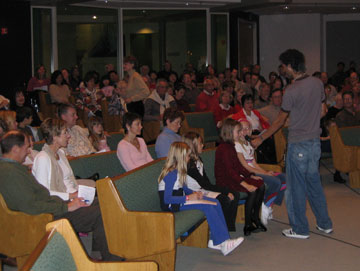 |
|
| Another of my happiest moments: the lighting of the Christ candle of the Advent wreath on Christmas Eve. We had families (and sometimes groups of friends) light the candles, with readings from Scripture and prayers. Always a sweet time. | 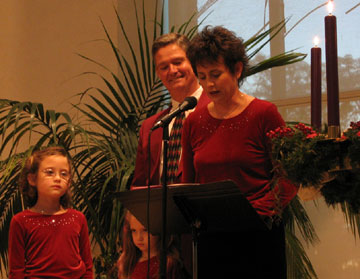 |
Topics: Pastors and Churches | 1 Comment »
Some Memories in Pictures
By Mark D. Roberts | Friday, September 21, 2007
Part 5 of series: Grace in the Rearview Mirror: A Pastoral Retrospective
Permalink for this post / Permalink for this series
| Baptizing a high school girl who became a Christian. Yes, am immersing her (sort of) in a kiddie pool. | 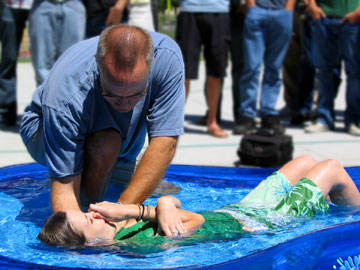 |
|
| The Sanctuary of Irvine Presbyterian Church early on Easter morning before the sunrise service. |  |
|
| The sanctuary during our Festival of Carols celebration. | 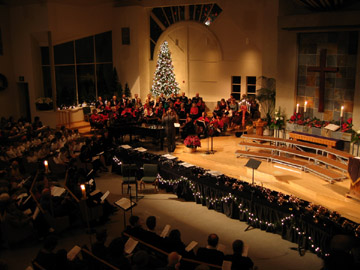 |
|
| Some of the children of the church getting ready to celebrate Palm Sunday. |  |
|
| A scene at my installation as pastor, on June 29, 1991. From the left: Ben Patterson, our founding pastor; me; Lloyd Ogilvie, my mentor and, at that time, the pastor of the First Presbyterian Church of Hollywood. | 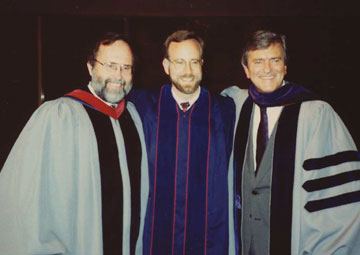 |
Topics: Pastors and Churches | 1 Comment »
Flooded with Gratitude
By Mark D. Roberts | Thursday, September 20, 2007
Part 4 of series: Grace in the Rearview Mirror: A Pastoral Retrospective
Permalink for this post / Permalink for this series
Every time I sit back and begin to reflect on my last sixteen years of ministry at Irvine Presbyterian Church, I am flooded with gratitude.
At first my mind is filled with images of people, people who have been my colleagues, friends, brothers, sisters, fellow-laborers, and prayer partners. I think of those who have been consistently faithful as encouragers. I remember those who have opened their hearts to me as they have struggled with hard things, and then who have shared their joy in subsequent times of blessing. And so it goes, on and on.
You may have noticed that I started my list of people for whom I am grateful with “colleagues.” Pastoring can be a lonely business, not to mention a tiring one. But God gave me some wonderful co-workers: associate pastors and others on my staff who labored side-by-side with me, prayed with me, forgave me when I was short with them, defended me when I was criticized, dreamed with me about God’s future for our church, and shared with me in long hours of service. My staff and I have laughed together and wept together. We’ve shared, not just ministry, but life. One of the things I will miss most when I leave Irvine Presbyterian Church is the friendship of my staff colleagues. (Photo to the right: one of the entrances to the patio of Irvine Presbyterian Church.)
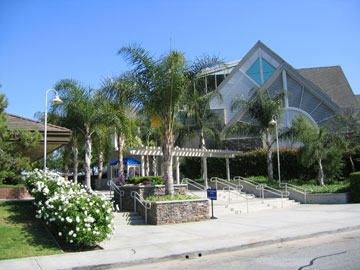 I am grateful for so many things God has done in this church during the last sixteen years. Some are obvious, like new buildings or new ministries. Most of God’s works have been less obvious, having to do with people’s souls. I have seen God do amazing things.
I am grateful for so many things God has done in this church during the last sixteen years. Some are obvious, like new buildings or new ministries. Most of God’s works have been less obvious, having to do with people’s souls. I have seen God do amazing things.
Let me cite just one example. Several years ago a young woman made an appointment to see me. Carolyn was a brilliant graduate student at the University of California, Irvine, on the way to finishing her Ph.D. in Chemistry. As I soon learned, she was also Jewish. Why was she meeting with a Christian pastor? Because Carolyn was interested in Christianity, and had “a few questions.” A few! She brought in a list of the twelve toughest questions about Christian faith, from “Why does God allow suffering?” to “Why is Jesus the only way of salvation?” As Carolyn asked me her questions, and as I tried to offer some reasonably coherent answers, I felt discouraged. “Here is this bright young woman,” I thought, “a Jewish grad student in science, and there’s no way I can begin to satisfy her concerning so many tough issues.” I felt terribly inadequate, rather like a failure as a pastor.
At the end of our meeting Carolyn allowed me to pray for her, and I promised to keep doing it. Sometimes I would see her in the congregation while I preached, and I would offer a silent prayer that God would make Himself known to Carolyn. But I knew the odds of a Jewish grad student in Chemistry becoming a Christian weren’t high, at least from a human perspective. So my prayer wasn’t exactly bursting with faith, I have to confess.
About a year after our first meeting, I had the incredible privilege of baptizing Carolyn as she made her public profession of faith in Christ. In that moment I felt overwhelmed by God’s grace to Carolyn and, in some small measure, to me. What a joy it was to have been a part of her journey to faith!
I couldn’t even begin to count the number of times I have experienced God’s grace in my ministry. I’ve already written about that. Each time I sense God’s kindness, I felt a huge measure of gratitude. And as I look back at my ministry in a rear view mirror, my gratitude mounts up even higher.
Topics: Pastors and Churches | No Comments »
Pastoring by Grace, Section 2
By Mark D. Roberts | Wednesday, September 19, 2007
Part 3 of series: Grace in the Rearview Mirror: A Pastoral Retrospective
Permalink for this post / Permalink for this series
In my last post I explained my conviction that my pastoral work at Irvine Presbyterian Church was by God’s grace. The gifts and talents that enabled me to be a pastor are themselves evidence of grace. Moreover, in many and various ways I experienced God’s grace in the form of extra help when I most needed it.
Let me cite two common examples. There were many, many times when, as I was preparing a sermon, I’d get stuck. Either I couldn’t figure out the precise meaning of a biblical passage, or I knew the meaning but was lacking a strong illustration to bring home the point. In these times I’d call out to God for extra help. Sometimes I’d have to wait on Him for a while before that help would come. But there were many times when the Holy Spirit would immediately respond to my request. All of a sudden I’d see what was really going on in a biblical passage. Or in a moment I’d have a fantastic illustration. There was no question in my mind that God was helping me by His grace. Was I working hard to be a truthful, relevant preacher? Yes, indeed. But it was also God’s grace working through me. (Photo: I’m holding forth in the sanctuary of Irvine Pres.)
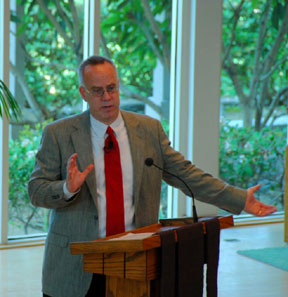 There were quite a few times during the past sixteen years when I became discouraged. Often these were associated with overwork, and with my subsequent neglect of my family, my devotional time, and my personal health. But they usually began with some negative event, or perhaps with a harsh word of criticism from somebody in the church. When my heart felt heavy, I’d call out to God for help. Sometimes this process of crying out went on for days or even months. But there were other times when the Lord answered my prayers quickly. For example, dozens of times when I was feeling discouraged, a member of the church would come up to me and, out of the blue, tell me a story about how something I had done really helped them in their faith. Similarly, there were many times when encouragement would come in the form of thank you notes or e-mails. These were such obvious instances of God’s grace helping me to keep going as a pastor.
There were quite a few times during the past sixteen years when I became discouraged. Often these were associated with overwork, and with my subsequent neglect of my family, my devotional time, and my personal health. But they usually began with some negative event, or perhaps with a harsh word of criticism from somebody in the church. When my heart felt heavy, I’d call out to God for help. Sometimes this process of crying out went on for days or even months. But there were other times when the Lord answered my prayers quickly. For example, dozens of times when I was feeling discouraged, a member of the church would come up to me and, out of the blue, tell me a story about how something I had done really helped them in their faith. Similarly, there were many times when encouragement would come in the form of thank you notes or e-mails. These were such obvious instances of God’s grace helping me to keep going as a pastor.
Yet I want to add a word of caution. The examples I have just given might suggest that most of the time I was pastoring in my own strength. Then, in special moments, God helped me. I would admit that it sometimes felt like this. I can be rather dull spiritually, I must confess. But when I look back upon my ministry, I can see clearly that God was at work in and through me even when I was completely unaware of it. The special gifts of grace, like preaching illustrations or notes of encouragement, were simply times when God’s goodness to me was so obvious I couldn’t miss it. Besides, I believe that the natural talents that I used as a pastor were themselves gifts from God. As Paul wrote in 1 Corinthians 4:7: “What do you have that you did not receive? And if you received it, why do you boast as if it were not a gift?”
From this perspective, everything I invested in my ministry at Irvine was a gift of grace. This doesn’t deny the fact that I worked hard. But it sees even my very ability to work, my health and personal energy, as God’s grace active within me. Thus, as I look back at the last sixteen years of pastoral ministry, I rejoice in God’s grace, and I am filled with gratitude. I’ll have more to say about gratitude in my next post.
Topics: Pastors and Churches | 5 Comments »
Pastoring by Grace, Section 1
By Mark D. Roberts | Tuesday, September 18, 2007
Part 2 of series: Grace in the Rearview Mirror: A Pastoral Retrospective
Permalink for this post / Permalink for this series
I’m calling this series on my pastoring Grace in the Rearview Mirror. As I begin to reflect on my sixteen plus years as pastor of Irvine Presbyterian Church, the idea of grace comes immediately to mind.
As this series progresses, I trust you’ll see why grace has been such a central part of my ministry as a pastor. But I didn’t invent the connection between ministry and grace. I got it from St. Paul, who associates the two concepts several times in his letters.
For example, in Ephesians 3:7-8 we read:
Of this gospel I have become a servant according to the gift of God’s grace that was given me by the working of his power. Although I am the very least of all the saints, this grace was given to me to bring to the Gentiles the news of the boundless riches of Christ.
Paul is an apostle because of God’s grace, plain and simple. Grace, by the way, is God’s unmerited favor or kindness. It is God giving us goodness that we do not deserve. By definition, grace cannot be earned. It’s always a gift.
A chapter later in Ephesians, Paul explains that all Christians are recipients of the grace that enables them to be ministers: “But each of us was given grace according to the measure of Christ’s gift” (Eph 4:7). This grace becomes activated when Christians engage in ministry, “building up the body of Christ” (Eph 4:12).
Yet because we all minister by grace, this doesn’t mean we just sit there and let it happen magically through us. God’s grace is at work as we are working for God’s purposes. Notice what Paul says in 1 Corinthians 15:
But by the grace of God I am what I am, and his grace toward me has not been in vain. On the contrary, I worked harder than any of them [the other apostles]—though it was not I, but the grace of God that is with me (1 Cor 15:10)
Paul was an apostle of Jesus Christ, not by his own volition or effort, but by the grace of God. This grace wasn’t wasted on Paul, because it led him to work hard as a minister of Christ. Yet Paul saw even his strenuous labors as God’s grace active within and through him. Did Paul work hard as an apostle? Yes, indeed, harder than others like him. Yet it really wasn’t his effort, but God’s grace at work in him.
Christian ministry is like this, whether it’s done by apostles, pastors, or lay people. It takes lots of human effort. It can be downright tiresome. It’s hard work. Yet, from another perspective, ministry is not so much our effort as it is the flow of God’s grace through us.
Did I work hard as pastor of Irvine Presbyterian Church? As my Wisconsin friends would say, “You betcha!” I spent many late nights at church meetings and rose early on many mornings to teach my Bible study or to pray with my elders. I worked on both days of almost every weekend, preaching once at our Saturday evening service and three times on Sunday mornings. Though I managed to take most Mondays off, there were times when I’d work thirteen or fourteen hours a day for a stretch, especially when we were in the midst of a capital campaign. (The picture to the right is from one of the busiest weeks of my pastoral life, Vacation Bible School week. But, just because I worked hard, that doesn’t mean I didn’t have fun, along with a couple of my friends and fellow laborers.)
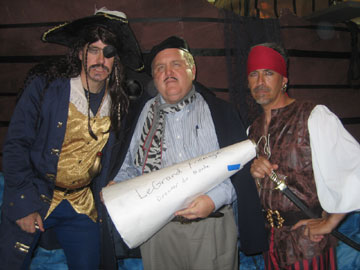 I’m not saying all of this to boast (or to confess my foolishness, for those of you who don’t see overworking as a cause for boasting!). I’m simply noting that, like Paul, I worked hard. (Paul, by the way, worked full-time as a tentmaker, and did his Christian ministry as a lay person.) Moreover, like Paul, I feel the need to qualify my statement of working hard by adding that it really wasn’t me, but God’s grace active through me.
I’m not saying all of this to boast (or to confess my foolishness, for those of you who don’t see overworking as a cause for boasting!). I’m simply noting that, like Paul, I worked hard. (Paul, by the way, worked full-time as a tentmaker, and did his Christian ministry as a lay person.) Moreover, like Paul, I feel the need to qualify my statement of working hard by adding that it really wasn’t me, but God’s grace active through me.
I know this sounds like the kind of religious things that pastors are apt to say. But I really mean it. For one thing, I believe that all the talents and gifts that enabled me to be a pastor were gifts from God. Moreover, there were many times, hundreds upon hundreds, when I sensed God’s extra help as I did my pastoral work. I expect there were thousands of times when God was graciously assisting me even though I didn’t realize it or give Him the credit He was due.
In my next post in this series I’ll supply some examples of how I experienced God’s grace in my pastoral ministry.
Topics: Pastors and Churches | 5 Comments »
Grace in the Rearview Mirror: Introduction
By Mark D. Roberts | Monday, September 17, 2007

Part 1 of series: Grace in the Rearview Mirror: A Pastoral Retrospective
Permalink for this post / Permalink for this series
Two weeks from today I will be driving across Arizona on my way to Texas, having said goodbye to California and the life I have known the better part of two decades. After sixteen years and three months as Pastor of Irvine Presbyterian Church, I have taken a new position as Senior Director and Scholar-in-Residence for Laity Lodge, a multifaceted ministry in the Hill Country of Texas. (For more information on this new calling, check out my letter to my congregation. I’ll blog about Laity Lodge down the road a piece. Photo to the right: The sanctuary of Irvine Presbyterian Church.)
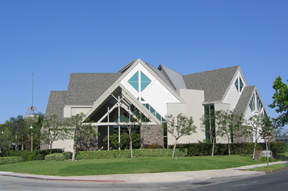 As you can well imagine, I have mixed feelings about this pending move. On the one hand, I’m excited by the opportunities and challenges offered by Laity Lodge, and look forward to joining the great team of people there. Yet, on the other hand, I feel deep sadness about leaving my church, especially leaving the wonderful people here who have loved me and whom I have loved for the past sixteen years. I would always have hoped that when it was time for me to leave Irvine Pres, both my congregation and I would feel some sadness about it. I’m glad folks aren’t cheering, happy to finally get rid of me. (Or, if they are, they’re doing it in secret.) But the sweet sorrow of leaving is, understandably enough, both sweet and sorrowful.
As you can well imagine, I have mixed feelings about this pending move. On the one hand, I’m excited by the opportunities and challenges offered by Laity Lodge, and look forward to joining the great team of people there. Yet, on the other hand, I feel deep sadness about leaving my church, especially leaving the wonderful people here who have loved me and whom I have loved for the past sixteen years. I would always have hoped that when it was time for me to leave Irvine Pres, both my congregation and I would feel some sadness about it. I’m glad folks aren’t cheering, happy to finally get rid of me. (Or, if they are, they’re doing it in secret.) But the sweet sorrow of leaving is, understandably enough, both sweet and sorrowful.
It seems appropriate for me to compose some thoughts as I finish my ministry at Irvine Presbyterian Church. In the days ahead, I’ll put up whatever strikes me as worth sharing with my blog readers. My hope in doing this is not only to do some personal reflection, but also to help others in their thinking about the church in general and pastors in particular. Most of my readers are not pastors, though quite a few are, actually. But most of my readers have pastors or priests, and are concerned about what happens in the church, at any rate.
I have entitled this blog series Grace in the Rearview Mirror: A Pastoral Retrospective. The “pastoral retrospective” part should be pretty obvious, since I’m going to look back at my sixteen years as a pastor. Ditto with the “rearview mirror” imagery. But you may be wondering why I’ve chosen the word “grace” to sum up my ministry at Irvine Presbyterian Church.
I’ll begin to answer that question in tomorrow’s post.
Topics: Pastors and Churches | 6 Comments »
Sunday Inspiration from Pray the Psalms
By Mark D. Roberts | Sunday, September 16, 2007
Excerpt
There he broke the flashing arrows,
the shield, the sword, and the weapons of war.
Psalm 76:3
Click here to read all of Psalm 76
Prayer
O Lord, it seems sadly ironic that this psalm celebrates Your vanquishing the weapons of war in Jerusalem. Even today, this city You once chose for Your dwelling place is in the center of tension, a place where violence looms, a locus of hostility and division. The weapons of war still threaten Jerusalem and its people, much as they did ages ago.
There have been times, Lord, when You have broken the implements of warfare, times when You have granted peace to Jerusalem. The memory of these occasions is sweet, to be sure. But it also gives us a yearning for the peace yet to come. We long for the day when You will finally reign in full upon the earth, destroying weapons, decimating oppression, and ushering in the peace that You alone can give.
In the meanwhile, Lord, we celebrate what You have done in the past, even as we look forward to what is yet to come. We pray for Your kingdom to come. We pray for You to come. Maranatha! Come, Lord Jesus!
Postscript
Then I saw a new heaven and a new earth; for the first heaven and the first earth had passed away, and the sea was no more. And I saw the holy city, the new Jerusalem, coming down out of heaven from God, prepared as a bride adorned for her husband. And I heard a loud voice from the throne saying,
“See, the home of God is among mortals.
He will dwell with them as their God;
they will be his peoples,
and God himself will be with them;
he will wipe every tear from their eyes.
Death will be no more;
mourning and crying and pain will be no more,
for the first things have passed away.”
Revelation 21:1-4

Glorious are you, more majestic than the everlasting mountains.
Psalm 76:4
Photo: Grand Tetons, 2004
Topics: Sunday Inspiration | 3 Comments »
MissionInsite: Hi-Tech Help for the Missional Church
By Mark D. Roberts | Saturday, September 15, 2007
This week saw the launch of a new ministry, MissionInsite. MissionInsite provides demographic data to churches and denominational bodies, so that they might minister more effectively to their own members and to their neighbors. Or, to put it in the terms of my latest series, MissionInsite will help the church be more faithful in our missional calling.
 What makes MissionInsite special? Basically, they offer unmatched ability for a church or other Christian organizations to understand the people they serve and are called to reach. MissionInsite uses ground-breaking computer technology to allow organizations to get precisely the information they want in precisely the form that is most helpful for them. MissionInsite doesn’t offer pre-packaged information. Rather, organizations gain online access to almost infinite configurations of data. They can get exactly what they need to help them understand and advance their ministries.
What makes MissionInsite special? Basically, they offer unmatched ability for a church or other Christian organizations to understand the people they serve and are called to reach. MissionInsite uses ground-breaking computer technology to allow organizations to get precisely the information they want in precisely the form that is most helpful for them. MissionInsite doesn’t offer pre-packaged information. Rather, organizations gain online access to almost infinite configurations of data. They can get exactly what they need to help them understand and advance their ministries.
I have been aware of the development of MissionInsite for some time, because one of the ministry’s co-founders is a good friend of mine. Mike Regele, author of Death of the Church, has been a consultant to churches and denominational bodies for years. He has earned the respect of church leaders everywhere because of his unusual offering of biblical vision, helpful data, solid wisdom, and personal integrity. Mike and his colleuages have developed a marvelous new tool for the church in MissionInsite. I recommend them highly.
For more information, check out the MissionInsite website.
Topics: News | 1 Comment »
P.S. - Is the Missional Church Just a Fad?
By Mark D. Roberts | Friday, September 14, 2007
Part 17 of series: The Mission of God and the Missional Church
Permalink for this post / Permalink for this series
As I was working my way through this series, I received a question from Matthew in one of the comments. He wondered, “Do you think being missional is just a passing fad as marketing was for the church a few years back?”
Great question! The church has a way of making a big deal out of something for a while, only to forget about it later. Yes, this happened with marketing, as Matthew points out. In the 90s the big deal was “cell groups” and “seeker-sensitive” worship. Now you rarely hear those phrases, for better or for worse. So, will “missional” go the way of “marketing,” “cell groups,” and “seeker-sensitive”?
Since I don’t claim to have prophetic gifts, at least in the “tell-the-future” mode, I can’t answer Matthew’s question with any certainty. But this question does give me a chance to say something crucial about the missional character of the church. No matter whether we use the word “missional” or not, I think I’ve shown in this series that the church is meant by God to be essentially missional. Or, to make it more particular, every single church should accept its identity as a missional community, a group of people who have been sent by God to do His work and share His truth in a given place.
Thus, the church is necessarily missional in a way that differs from how it might or might not be cell group based or seeker sensitive or committed to marketing the gospel. In fact, one might even say, on biblical and theological grounds, that the church should not be cell group based or seeker sensitive or committed to marketing the gospel. But on those very same grounds, it seems to me very clear that the church is missional at its very core. In a sense, every single church has been “sent” by God to do God’s work. Every church should recognize its missional identity and should act in faithfulness to this identity.
Of course I’m the first to admit that this doesn’t always happen. Many churches, perhaps most, are more committed to self preservation and meeting the needs of members than to mission. But I hope and pray that more and more churches will move away from this inward-looking posture to one that is truly and fully missional.
Will the word “missional” remain an active part of our vocabulary as Christians? Who knows? But let me close with a story that might help to answer this question.
When I first heard the church described as missional, and when I came to understand what the word “missional” meant, I was 100% supportive of the idea. But I didn’t like the language. “Missional” sounded strange to my ears, and I feared that calling the church missional would be confusing. Many people would assume that the missional church is one committed to overseas missions, to sending and supporting missionaries, rather than to local mission, to spreading the good news of Christ in one’s own neighborhood.
Mike Regele, a good friend of mine, was a strong advocate for the “missional” label. Once, while we were having breakfast together, he said to me, “I hope for the day when I’ll hear in my own church the fact that we are missional.” I responded by saying, “I’m with you completely when it comes to the idea, but I don’t think I’ll ever use the word ‘missional.’ It’s just too confusing.” Mike wasn’t happy with me, but he accepted my conclusion.
Two years later, I preached a series of sermons on the church as a missional community, making it very clear to my own congregation that we were to be a missional church. Mike was happy. More importantly, I believed I was using an appropriate word to educate and challenge my people to be who they were in Christ.
So, it seems to me that the word “missional” just might have legs. It might be around in ten years, maybe even in a hundred, because it captures something essential about the church. But whether or not the word “missional” sticks, my hope and prayer is that the church of Jesus Christ, and every single individual church, will recognize our essentially missional character, and will be fully invested in the mission to which God has sent us. May this never pass away as some sort of temporary fad.
Topics: Mission | 4 Comments »
Practical Questions and Answers About the Missional Church
By Mark D. Roberts | Thursday, September 13, 2007
Part 16 of series: The Mission of God and the Missional Church
Permalink for this post / Permalink for this series
1. “I could get pretty excited about being a part of God’s mission in the world. But, frankly, I’m overwhelmed already. I’ve got way too much to do right now. What should I do?”
For most of us, involvement in the mission of Christ will alter our life priorities. If we are going to invest our time and energy in God’s work, we can’t continue to do all of the other things we have been doing. We’ll need to make new choices in light of new values.
This process of reevaluation happens best in a community of Christians who are asking the same kinds of questions as you are. Question #1 would be a great discussion starter in a small group. In time, God will make his priorities for your life clear as you seek his will together with other believers.
That last sentence is so important. As a Christian, you have acknowledged Jesus as Lord and are committed to seek his will for your life. You live now under the reign of God. God will guide you into a new way of living as you seek him. In addition to sharing your quest for guidance with other believers, I’d urge you to ask God directly. The Holy Spirit dwells within you, not only to empower you for mission, but to make clear where in God’s mission you belong.
Beware of the tendency, however, to get overly involved in worthy Christian causes without giving up other activities. Well-meaning believers can exhaust themselves by taking on more than God intends for them at one time.
2. “Even though you talk about ‘just being honest,’ I’m still not comfortable with the idea of sharing my faith with others. What would you suggest to help me get started?”
Years ago someone admitted to me, “Evangelism is such a pain. It just makes me feel guilty. I wish I didn’t have to think about it.” As I reflected upon his confession, I framed a simple model for getting started in sharing Christ. I called it the “P.A.I.N.S. of Evangelism.” If evangelism is such a pain, then let’s go with that idea! You can begin to share your faith with others by doing the following:
Prayer. Since evangelism is primarily God’s work, begin by praying. Confess your hesitations and fears to God. Ask him to give you courage. Ask for a wide open door to share your faith with someone. Pray for those in your life who don’t know the Lord. If you pray faithfully, God will use you. (We could almost stop here, but a “P” model for faith-sharing wouldn’t be too compelling!)
Availability. If you are available, God will use you. As you pray, tell the Lord that you are open to be used to share the good news. Then, as you go about your normal business, remain available. God will sometimes give you a chance to share when you least expect it.
Invitation. Don’t panic! I’m not using the word “invitation” in the technical sense, to describe what Billy Graham does after delivering an evangelistic message. Rather, I’m encouraging you to invite people to gatherings where they will hear the good news. You may feel insecure about your ability to summarize the gospel message, but you can certainly invite a friend to church, or to a Promise Keepers gathering, or to a women’s Bible study, or to a retreat, and so forth. I have seen many tongue-tied Christians help lead a friend to Christ simply by inviting that friend to a place where someone else does most of the talking about Jesus.
Neighborliness. Scripture teaches you to love your neighbor as yourself. If you keep this in mind, God will open up opportunities for you to speak easily about Jesus. Moreover, your love will pave the way for a open-minded hearing of what you have to say.
Sharing. When God opens a door, walk through it. In an honest and humble way, simply share with people your faith in Christ. You don’t have to preach. You don’t have to pretend to be the Bible Answer Man. Simply explain what Jesus means to you and how he has enabled you to be reconciled to God. As you share, the Spirit will help you.
Topics: Mission | 8 Comments »















